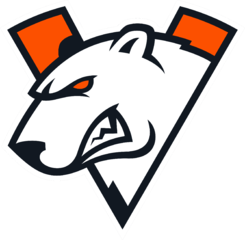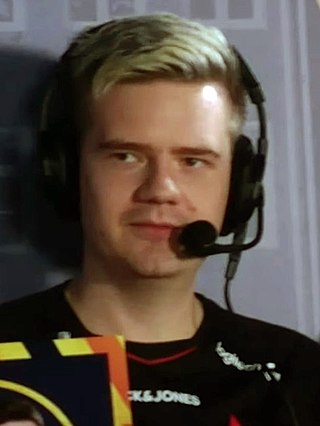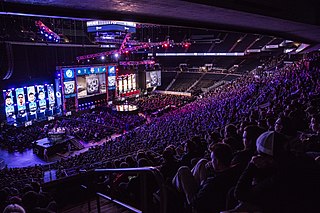
Made in Brazil, commonly referred as abbreviated name MIBR is a professional esports organization with players competing in Counter-Strike: Global Offensive,Tom Clancy's Rainbow Six: Siege and VALORANT. It was a member of the G7 Teams. MIBR was founded on March 1, 2003, in the city of Rio de Janeiro, when the Brazilian businessman Paulo Velloso decided to invest in his son's dream. The organization was dissolved in 2012, but announced it was making a return in March 2016, returning to active play years later in June 2018.

Ninjas in Pyjamas (NIP) is a professional esports organisation based in Sweden that is best known for its Counter-Strike teams. In 2012, the team reformed with a Counter Strike: Global Offensive lineup upon the release of the game. Aside from Counter-Strike, the organisation has teams in Valorant, Rainbow Six Siege, FIFA, Rocket League, and League of Legends. They formerly had teams in Fortnite Battle Royale, Overwatch, PlayerUnknown's Battlegrounds and Paladins.

Counter-Strike: Global Offensive (CS:GO) is a 2012 multiplayer tactical first-person shooter developed by Valve and Hidden Path Entertainment. It is the fourth game in the Counter-Strike series. Developed for over two years, Global Offensive was released for OS X, PlayStation 3, Windows, and Xbox 360 in August 2012, and for Linux in 2014. Valve continues to regularly update the game, both with smaller balancing patches and larger content additions.
The ESL Gaming GmbH, doing business as ESL, is a German esports organizer and production company that produces video game competitions worldwide. ESL was the world's largest esports company in 2015, and the oldest that is still operational. Based in Cologne, Germany, ESL has eleven offices and multiple international TV studios globally. ESL is the largest esports company to broadcast on Twitch.

FaZe Clan, or simply FaZe, is a professional esports and entertainment organization headquartered in Los Angeles, California, United States. Founded on May 30, 2010, as FaZe Sniping, the organization has players from around the world, across multiple games, including Call of Duty, Counter-Strike: Global Offensive, PlayerUnknown's Battlegrounds, Tom Clancy's Rainbow Six Siege, Halo Infinite,Valorant, Fortnite Battle Royale,Rocket League, and Super Smash Bros. Ultimate. In 2020, the organization expanded into the Asian market, acquiring a Thai PUBG Mobile and FIFA Online roster.

Virtus.pro (VP) is an international esports organization founded in 2003 in Russia and acquired by Armenian investors in 2022. The organization has players competing in such games as Counter-Strike: Global Offensive, Dota 2, Rainbow Six Siege, PUBG Mobile, and Warface.

Richard Lewis is a British esports journalist and livestream commentator from Wales. Having written technology articles for The Daily Dot, Breitbart News, and Cadred, he is best known as an esports journalist and as a former desk host of ELEAGUE.

Astralis is a Danish esports organization. Best known for their Counter-Strike: Global Offensive team, they also have teams representing other games, such as FIFA, League of Legends and Rainbow Six Siege. The parent group of Astralis is the Astralis Group, who previously managed Origen and Future F.C. before the merger of all teams under the Astralis brand. Astralis Group became the first esports organization to conduct an initial public offering, and is traded as ticker ASTRLS.CO. Astralis's CS:GO team holds the most CS:GO Major Championships won at 4.

Peter Rothmann Rasmussen, better known as dupreeh, is a Danish professional Counter-Strike: Global Offensive player. He has played for Team Dignitas, Team SoloMid, Astralis and Team Vitality. In 2023, he became the first and only player to win 5 majors in CS:GO, and to win 3 majors consecutively. Due to the Blast Paris Major 2023 being the last CS:GO major as a result of the subsequent PGL Copenhagen 2024 Major being played in the upcoming Counter-Strike 2, Rasmussen is the only player to participate in every CS:GO major.

100 Thieves, LLC is an American lifestyle brand and gaming organization based in Los Angeles, California, founded in 2017 by Matthew "Nadeshot" Haag. The organization competes in several video games, including Apex Legends, Call of Duty, League of Legends and Valorant. They currently operate three franchise teams, in the League Championship Series (LCS), Valorant Americas League and Call of Duty League.

OG is a professional esports organisation based in Europe. Formed in 2015, they are best known for their Dota 2 team who won The International 2018 and 2019 tournaments. They also have a Counter-Strike: Global Offensive team.

Christopher Kjell Mykles, better known by his nickname MonteCristo, is an esports league commissioner and former color commentator, analyst, and organization owner.

Godsent is a Swedish professional esports organization formed by Markus "pronax" Wallsten. It currently has teams competing in Counter-Strike: Global Offensive, Call Of Duty Mobile, Dota 2, Hearthstone, Rainbow Six: Siege, Apex Legends and League of Legends.
The Counter-Strike match fixing scandal was a match fixing scandal involving two professional Counter-Strike: Global Offensive (CS:GO) teams, iBUYPOWER and NetCodeGuides, which resulted in the banning of 4 North American players by Valve after an expository article by esports journalist Richard Lewis. The scandal has been cited as "the first large match fixing scandal" in the CS:GO community.

Counter-Strike: Global Offensive Major Championships, commonly known as the Majors, are Counter-Strike: Global Offensive (CS:GO) esports tournaments sponsored by Valve, the game's developer. The first CS:GO Major took place in 2013 in Jönköping, Sweden and was hosted by DreamHack with a total prize pool of US$250,000 split among 16 teams.

Turner "Tfue" Tenney, better known as Tfue, is a former streamer and esports player, best known for playing Fortnite.

Professional Counter-Strike competition involves professional gamers competing in the first-person shooter game series Counter-Strike. The original game, released in 1999, is a mod developed by Minh "Gooseman" Le and Jess Cliffe of the 1998 video game Half-Life, published by Valve. Currently, the games that have been played competitively include Counter-Strike, Counter-Strike: Condition Zero (CS:CZ), Counter-Strike: Source (CS:S) and Counter-Strike: Global Offensive (CS:GO). Major esports championships began in 2001 with the Cyberathlete Professional League Winter Championship, won by Ninjas in Pyjamas.
The Counter-Strike coaching bug scandal is an ongoing bug abuse scandal in the game Counter-Strike: Global Offensive. The bug had three variants, all of which allowed team coaches to see parts of the map they normally would not have access to and gather information about the enemy team.

One True King (OTK), legally OTK Media, Inc., is an American media organization based in Austin, Texas. The organization primarily focuses on online content creation and previously competed professionally in World of Warcraft.
Cheating in esports is a deliberate violation of the rules of an esports governing body or other behavior that is intended to give an unfair advantage to a player or team. At its core, esports are video game competitions in an organized, competitive environment. Tournaments often pay out prize money to the highest placing teams in these events, giving players an incentive to cheat. Commonly cited instances of cheating include the use of software cheats, such as aimbots and wallhacks, exploitation of bugs, use of performance-enhancing drugs, such as Ritalin and Adderall, and match fixing.















